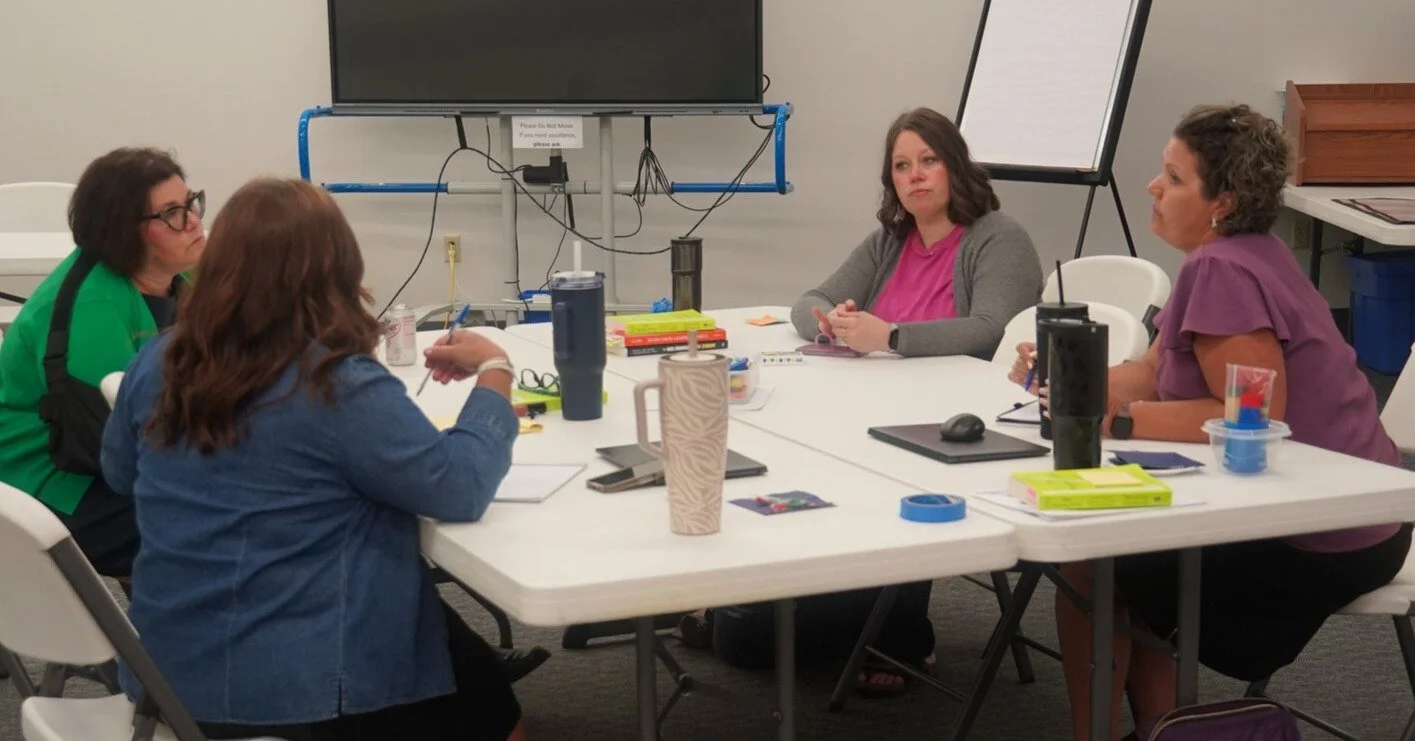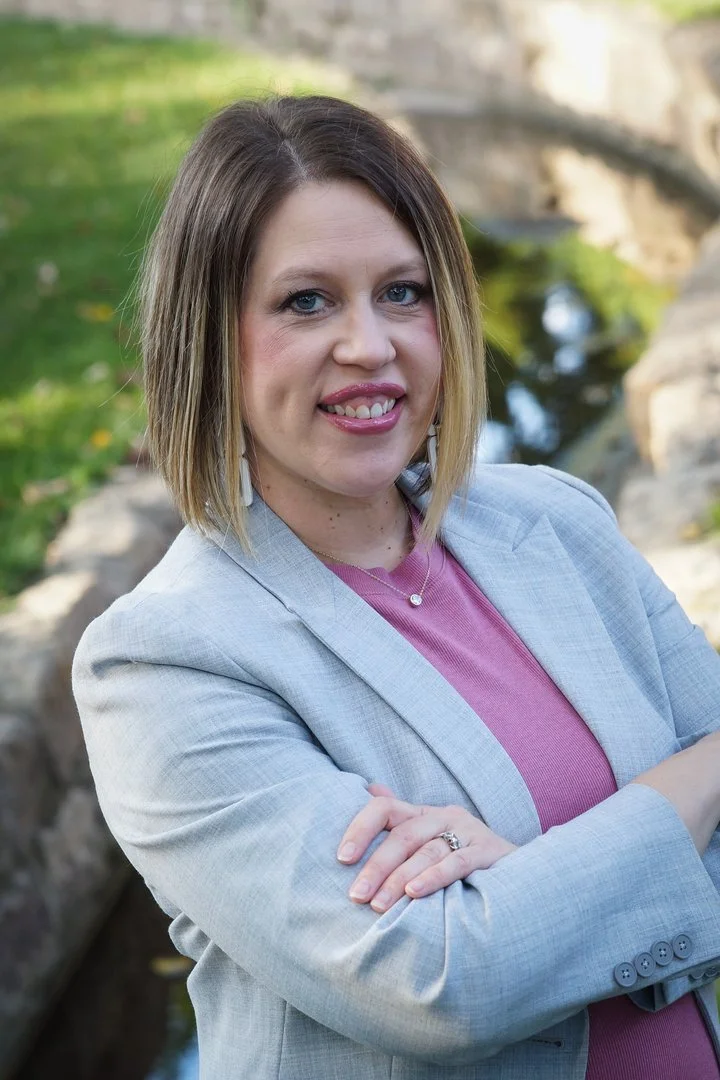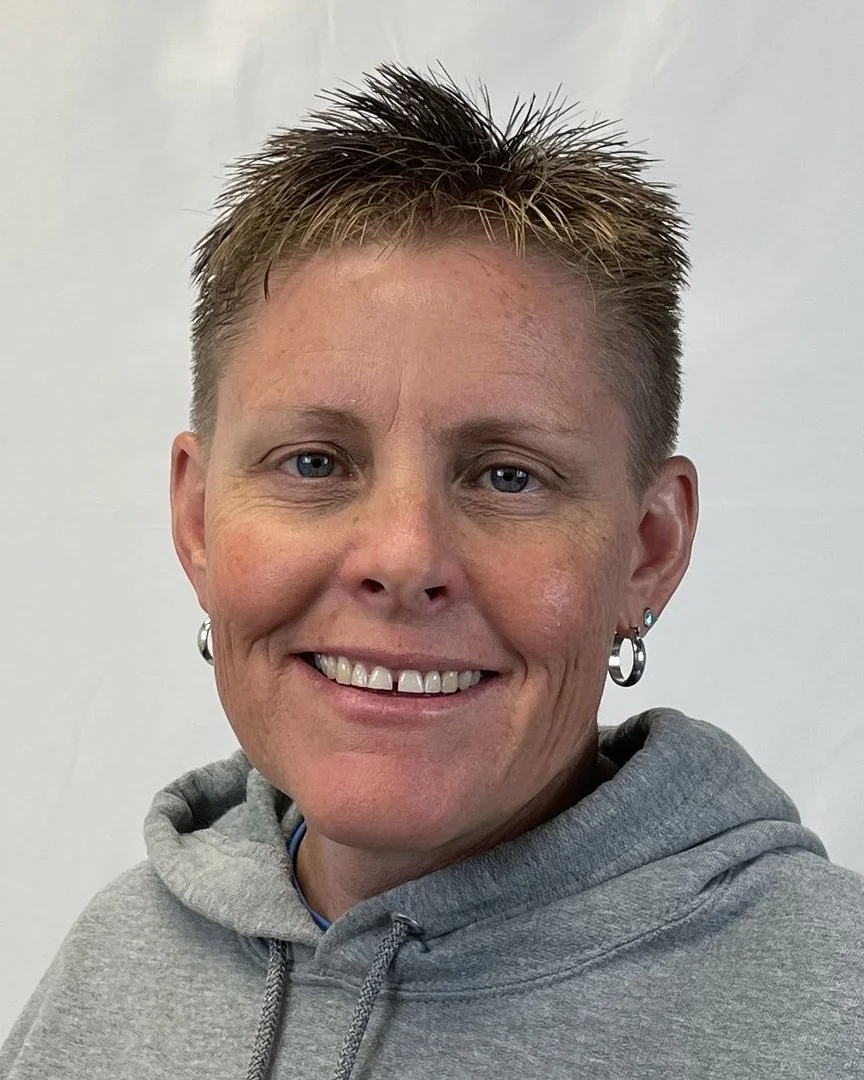Smoky Hill
PROFESSIONAL LEARNING OPPORTUNITES

Smoky Hill Education Service Center offers a variety of learning opportunities, including a schedule of workshops and events to attend at our facilities in Hays and Salina, Kansas, as well as virtually via Zoom. We support districts through a variety of evidence-based processes, programs, and professional learning.
Effective professional development enables educators to develop the knowledge and skills they need to address students’ learning challenges. To be effective, professional development requires thoughtful planning followed by careful implementation with feedback to ensure it responds to educators’ learning needs. Smoky Hill Education Service Center is a professional organization that provides resources and learning opportunities for educators to develop the knowledge and skills they need to help every student succeed both in the classroom and community.
Why Professional Development Matters
Teachers and administrators who routinely develop their knowledge and skills model for students that learning is important and useful. Their ongoing development creates a culture of learning throughout the school and supports educators’ efforts to engage students in learning. Good teaching is not an accident. While some teachers are more naturally gifted than others, all effective teaching is the result of study, reflection, practice, and hard work. A teacher can never know enough about how a student learns, what impedes the student’s learning, and how the teacher’s instruction can increase the student’s learning. Professional development is the only means for teachers to gain such knowledge. Whether students are high, low, or average achievers, they will learn more if their teachers regularly engage in high-quality professional development.
Professional development provides ongoing opportunities for educators to continue to improve their knowledge and skills so they can help students achieve. When educators learn, students learn more. Smoky Hill Education Service Center is composed of dedicated learning experts who share a single purpose: Every educator has the opportunity to engage in effective professional learning to ensure every student achieves. Consultants are committed to professional learning to improve schools and student learning.


Smoky Hill Education Service Center Consultants
Dr. Lydia Gerzel-Short
Dr. Lydia Gerzel-Short is the Assistant Director at Smoky Hill Education Service Center.
Dr. Gerzel-Short joins us from Northern Illinois University, where she has accumulated a wealth of knowledge and experience in education. Special education, teacher preparation, mentoring, and coaching, and high-quality instructional practices are just a few of her areas of expertise. Her background and experiences will be invaluable as we continue to support Kansas schools and educators.
Lydia is eager to meet everyone and begin contributing to our mission of fostering educational excellence across Kansas. Her passion for education is infectious, and her dedication to student success makes her a valuable member of our team.
Please reach out and introduce yourself to Lydia. We are excited about the contributions she will make to our service center and look forward to the positive impact she will have on our schools.
Robin Anderson
Robin Anderson started as an educational consultant for Smoky Hill ESC in 2023, and she has over 25 years of education experience. She earned her bachelor’s degree in Elementary Education and a master’s in Curriculum and Instruction at Kansas State University. She has experience planning and teaching math and reading interventions and K-6 classrooms in various combinations. She has the background to provide Building and District level support in large or small district settings. Her work as a building-level coach, support of the KS LiNK grant, implementation of the MTSS processes, and LETRS Facilitator gives her a well-rounded approach to many facets of the educational system.
Robin believes we are all lifelong learners and enjoys helping others explore their growth.
Jaye Ditter
Jaye Ditter started working with education service centers in 2000 and has worked at Smoky Hill ESC since 2005 as an Education Consultant. Working from the Hays location, Ditter provides PDC training, coordinates Teacher Safari, Safari Adventure and Expo programs and the Smoky Hill Education Foundation Golf Tournament each year. She is a 21st Century CCLC grant evaluator and a facilitator for the Smoky Hill ESC crisis intervention team and the Smoky Hill Adventure Program.
Jolene Goodheart Peterson
Jolene Goodheart Peterson is an Education Consultant for Smoky Hill Education Service Center. She also works as a Teacher Leader Consultant for the Kansas State Department of Education.
Jolene earned her bachelor’s degree in Secondary Mathematics Education, a minor in Leadership Studies and Programs, and a master’s degree in Curriculum and Instruction at Kansas State University. In March 2024, Jolene received the Kansas Association of Teachers of Mathematics Ray Kurtz Award in Recognition of Outstanding Leadership in Mathematics Education throughout Kansas.
Jolene has experience as a classroom teacher in Geary County Schools, Wamego Public Schools, and Salina Public Schools, as well as experience as a mathematics instructional specialist or math coach in Salina Public Schools. Her interests include mathematics teaching and learning, student mindset in mathematics, intrapersonal and interpersonal skills in the classroom, and learning-oriented grading and reporting practices.
Noalee McDonald-Augustine
Noalee McDonald-Augustine is in her 22nd year as an Educational Consultant, specializing in School Culture, Social-Emotional Learning, Character Education, Bullying, Classroom Management, and Poverty. She was co-chair of the Kansas Social, Emotional, and Character Development (SECD) standards writing team and co-chair of the SECD revisions team. She also manages the Smoky Hill Low and High Ropes Adventure Program. Noalee has a BA in Mathematics, a BA in Sociology with an emphasis in Criminal Justice, and her master’s work is in Physical Education with an emphasis in Adapted Populations.

Content Cadres
Leadership Cadre
Being a building principal can sometimes be a lonely job. These meetings are designed to offer an opportunity to share concerns, get feedback, and support your fellow building principals. We will discuss the hot topics of the day, special concerns or questions that you have from your building, and what trends or requirements are on the way in education. We will occasionally be joined by Kansas administrators, policymakers, and content area experts as well to share their points of view on current topics. A great opportunity to collaborate with your colleagues without having to leave your building!
For more information contact Chris Moddelmog at
cmoddelmog@smokyhill.org.
Mathematics Cadre
The Mathematics Cadre is an opportunity for educators to connect with each other and discuss how to support student, staff, and parents in the area of mathematics. Join fellow educators in understanding ways to maintain quality instruction and support the standards for mathematic practice during the school year. Participants will determine the discussion topics and areas of focus. Meetings will be via Zoom and will be recorded for those unable to attend in person.
For more information contact Jolene Goodheart Peterson at
jgoodheartpeterson@smokyhill.org
SECD Cadre
The SECD Support Cadre is an opportunity for educators to connect with each other and discuss how to support student, staff, and parent social-emotional learning and skills. Integrating Social, Emotional, and Character Development structures, practices, and teaching consciously and specifically will be essential throughout the school year. The discussion topics will be determined by the group - what is working, what is not working, what help is needed, or what participants want more information on.
For more information contact Noalee McDonald-Augustine at
nmcdonald@smokyhill.org
Tech Directors' Cadre
The Smoky Hill Technology Cadre is open to any technology coordinators and educators who are integrating technology for improved student learning in their districts’ classrooms. While we offer new and updated training and information, we also want to allow time for the exchange and discussion of all of the group members’ ideas for using technology in schools and classrooms. Topics discussed include using technology for teacher professional learning as well as for student learning, using available Internet databases and resources, 21st Century Literacy Skills for students and educators, and exploration of new technologies. Each session will include an ‘open agenda’ time for discussion and research on any topic that is brought to the group. The main goal of this workshop is to develop a learning community in which technology coordinators will learn and share best practices for using and managing technologies to improve student and educator learning environments.
For more information contact Chris Moddelmog at
cmoddelmog@smokyhill.org.

Instructional Coaching
We offer a variety of coaching and mentoring services at Smoky Hill Education Service Center. Our instructional coaching services empower K-12 school leaders and teachers to align their instruction and curriculum with readiness standards and motivate students to achieve their career and college goals.
Our consultants partner with teachers for job-embedded professional learning that enhances teachers' understanding of students, the curriculum, and pedagogy for the purpose of solving problems that impede teacher success and pursuing interests that enhance teacher success.
We believe coaching has several significant components:
Coaching is a partnership.
Coaching is job-embedded.
Coaching is about professional learning.
Coaching enhances teachers' capacity.
Coaching supports reflection about students, the curriculum, and pedagogy.
Coaching helps teachers enhance their success as teachers.
Quality teaching practices influence student achievement. Instructional coaching practices influence the quality of teaching. Instructional coaches are an incredibly important part of the student achievement equation.
Both in-person and virtual options are available.
Contact one of our education consultants to schedule a customized coaching program.
VECTOR Virtual Coaching
Smoky Hill Education Service Center is excited to announce a new partnership with VECTOR Virtual Coaching! The partnership is focused on bringing high-quality, accessible, personalized professional development
Virtual Instructional Coaching
The virtual coaching model supports classroom teachers with just in time, on-demand support to address student needs. Key to the coaching is modeling of effective instructional practices and use of data.

Earn Graduate Credit Hours with SHESC Workshops
Smoky Hill Education Service Center (SHESC) has partnered with MidAmerica Nazarene University (MNU) to provide you with graduate college hours for trainings you attend. MNU is an affordable way for you to earn credits.
Many of the workshops and trainings that we provide are eligible for graduate credit from MNU.
Visit our Workshops page for details on all upcoming SHESC workshops.
To register for all upcoming workshops click HERE and you will be redirected to our registration site.
Once you complete a SHESC workshop, you will receive an email with all the information you need to enroll and complete the process of earning MNU credit.
For every six-hour training opportunity, you have the option to earn 0.5 college graduate hours.
Each 1/2 credit costs $45. All classwork and payment is completed online through MNU.
All classwork is due seven days after the initial training, and you will send it directly to MNU.
Once you complete this initial training, you have the opportunity to earn additional credit through MNU’s STAR program and have up to one year to complete these requirements.
General Overview of the STAR Program:
Part 1: Knowledge: Basic Reflection - Attend the initial training and complete the reflection activity within seven days to earn 0.5 credit for each 6 hours of training. Within one year you can complete these additional parts to earn more credit. They have to be completed in sequence. You do not have to do all of the parts. All work from Part 1 - Part 5 is turned in directly to MNU on the same reflection document.
Part 2: Knowledge: Context and Learner (0.5) - Study more about the topic and apply the learning to how it impacts student and teacher achievement.
Part 3: Application: Instructional Planning, Assessment, and Implementation (1.0) - Create an instructional plan for a unit of study using what you learned and develop a hypothesis related to the impact on student achievement.
Part 4: Impact: Data and the Student (0.5) - Analyze the effectiveness of the unit of study in terms of your initial hypothesis and the data you collected.
Part 5: Impact: Reflection and Leadership (0.5) - Reflect on the impact of the unit of study and how you will use what you learned in the future.
Contact Dr. Lydia Gerzel-Short at lgerzel-short@smokyhill.org with questions about college credit for workshops.

Bullying Prevention
Anti-Bullying Service Available
SHESC can assist your district in preventing bullying among your students.
Kansas Anti-Bullying legislation implemented in 2008 requires all school districts to have an Anti-Bullying Plan.
Smoky Hill ESC has only one stance on bullying: It must stop. But we also know that is easier said than done.
If your school is looking for resources to meet this legislative requirement and to stop bullying, SHESC has what you need. We have programs and packages that can fit your individual needs and budget. We are ready to help stop bullying.
The question is, “Are you?”
Programs and services are available to help you review, update, develop, and implement the following components of your Anti-Bullying Plan:
District Needs Assessment – K-12 Student and Teacher Survey and Disaggregation
Written Policies
Procedures for Reporting and Documenting Incidents
Disciplinary Procedures
Staff Training and Resources
Instructional Coaching
Student Curriculum and Resources
Student Workshops
Parenting Workshops and Resources
Program Evaluation Procedures
For an anonymous reporting solution to identify and help prevent bullying, self-harm, and violence, SHESC's partnership with STOPit Solutions provides a proven system. A free demo and more information are available.
If you have questions, please contact Noalee McDonald-Augustine at 785-621-4414 or NMcDonald@smokyhill.org.
STOPit is an anonymous reporting solution used in thousands of schools worldwide to help keep students safe and make administrators’ jobs easier.
Through a mobile app, web, and phone reporting, STOPit helps administrators identify and even prevent school bullying, student self-harm, and acts of violence.
Benefits to administrators include:
24-hour incident monitoring with early warning sign triage
Tools to help get in front of issues and manage risk
Resources about issues and resolutions
Training and promotion services
STOPit is available at a discounted rate to any school in Kansas. Visit stopitsolutions.com/shesc to arrange for a free demo of this product with Nick Zema.
Contact Zema at nzema@stopitsolutions.com or 908-748-4552.

Career and Technical Education (CTE)
Career and technical educations (CTE) prepares students for a wide range of high-skill careers by providing core academic skills, employability skills and technical, job-specific skills. CTE programs integrate with academics to provide a rigorous and relevant education, often leading to industry-recognized certifications and credentials.
The Kansas State Department of Education provides a framework and guidance for CTE programs in Kansas secondary schools, utilizing the National Career Clusters® Framework. There are 36 Career Pathways available in 16 Career Clusters, and secondary schools may apply to offer these Pathways to their students.
Because both federal (Carl Perkins) and state (0.5 weighting) funds are available for CTE programs in Kansas, schools offering these Pathways must be aware of the regulations involved. Professional learning opportunities are provided by Smoky Hill Education Service Center to assist school personnel in fulfilling these regulations.
Career and technical education is a multi-faceted world and can be complicated to navigate. Professional learning is important to stay abreast not only of the most up-to-date skills needed to be taught in the Pathways but also the constantly changing requirements, labor-market needs, and new initiatives. Smoky Hill ESC provides workshops, professional learning networks, consulting, and coaching to assist administrators, educators and staff in navigating the complexities of CTE.
Call 785-825-9185 for more information about how Smoky Hill ESC can assist you with your CTE programs.
Resources
Kansas Career Navigator: Free tool to help students match with careers that match their interests and that are available in the communities where they want to live.
Resume Builder: Free online resume builder with examples of resumes and cover letters for a variety of careers. Check out their resumes and tips for internships HERE.

Crisis Management
Prevention/Planning/Responding/Recovery
Smoky Hill Education Service Center's Crisis Management Program assists schools in preventing, planning for, responding to, and recovering from any emergency or crisis that may happen at schools or nearby.
Contracting with SHESC for crisis management prevention and intervention means help with creating a plan to communicate before, during and after a crisis with students, staff, journalists and the community.
Smoky Hill ESC will also help with ensuring the safety of students and staff, protecting the district's property, and restoring normal educational processes as quickly as possible.
For more information contact:
Noalee McDonald-Augustine, (785) 621-4414 NMcDonald@smokyhill.org
After hours call: (785) 820-7922

Curriculum Services
SHESC Can Help Develop a Tiered System of Support
Curriculum alignment is an effective tool for improving teaching and learning. This support can be individualized for each district with the goal of transforming and improving your curriculum.
This can range from the first steps of the process to more advanced diagnostic stages of curriculum development using data to drive instruction.
The focus is on aligning curriculum to state standards and using curriculum maps to eliminate gaps and redundancies in the curriculum. Service Center staff can also work with your district to develop a plan for aligning your district curriculum.
For more information, contact Dr. Lydia Gerzel-Short at (785) 825-9185 or lgerzel-short@smokyhill.org.
Mathematics Instructional Curriculum & Resource Adoption Process
Implementation of the 2017 Kansas Mathematics Standards is complex and requires many components to be effective in developing mathematics learning for all students. Districts should always look for ways to better meet the needs of their students and propel them into becoming successful in any academic career or professional path that they choose.
Curriculum and other instructional resources play a significant role in the mathematics that is taught and learned. Educators will remember from education courses the various types of curricula explained by research. The types described by Glatthorn, Boschee, Whitehead, & Boschee (2012) are the recommended curriculum, written curriculum, supported curriculum, taught curriculum, tested curriculum, and learned curriculum. When researching and analyzing curriculum keep in mind the outcomes expected for your school or district and how the different types impact what students actually learn.
It is difficult to separate curriculum from the instructional practices employed by teachers when analyzing effectiveness. A quality curriculum should be provided to educators but quality professional development that is continuous and focused must also be provided (National Research Council, 2001). Educators should be aware of the interplay between the curriculum adopted and the instruction provided.
Once a curriculum is provided to educators, a purposeful and thoughtful plan must be utilized when implementing the units and the individual lessons. This does not mean that the curriculum is adhered to without thought toward the needs of the students that are in the classrooms. Educators need to understand those educational needs and make informed modification and adaptations within the curriculum as necessary, without losing sight of the end goal in mathematics. Maintaining rigor is essential!
As a committed mathematics educator, I believe that all students can learn mathematics at high levels and that all students deserve a robust, rigorous, and appropriate education. Mathematics education is constantly evolving, and, as a result, mathematics resources continually evolve.
Let Smoky Hill Education Service Center help you and your staff build an aligned, coherent, and rigorous mathematics curriculum.
For more information, contact Melissa Fast at 785-825-9185 or at melissafast@smokyhill.org.

Data Analysis to Support Academic Growth
Smoky Hill Education Service Center's Crisis Management Program assists schools in preventing, planning for, responding to, and recovering from any emergency or crisis that may happen at schools or nearby.
Contracting with SHESC for crisis management prevention and intervention means help with creating a plan to communicate before, during and after a crisis with students, staff, journalists and the community.
Smoky Hill ESC will also help with ensuring the safety of students and staff, protecting the district's property, and restoring normal educational processes as quickly as possible.
For more information contact:
Noalee McDonald-Augustine, (785) 621-4414 NMcDonald@smokyhill.org
After hours call: (785) 820-7922

Leadership Support
◊ Meets all KSDE mentoring requirements for new principals. ◊
◊ Additional meeting dates can be arranged if requested. ◊
Being a district or building leader is a great opportunity that comes with awesome responsibility. There are times where you will feel accomplishment, pride, and joy in the position. There also might be times where you feel confused, burdened, isolated, or even overwhelmed. The SHESC Leadership Support program is designed to allow you to share your accomplishments as well as get support and feedback from people who are, or have been, in your shoes.
We will discuss the hot topics of the day, special concerns or questions that you have from your building, and what trends or requirements are on the way in education. We will occasionally be joined by Kansas administrators, policy makers, and content area experts as well to share their points of view on current topics.
Join us to learn about how to balance the everyday demands of running a building or district while still accomplishing those “big things” that will mean better outcomes for your students!
Topics will include: leadership theories; using data to inform decision-making; the 21 responsibilities of school leaders; how to bring about lasting, meaningful change; doing the right work; and how to be an effective leader.
I wish we could meet every week!”
-Program participant
Dr. Lydia Gerzel-Short - Smoky Hill Education Service Center Assistant Director - will facilitate these monthly mentoring sessions. In addition, you will hear from other Kansas leaders, policymakers and content experts to make your school or district leadership as effective as possible.

Literacy Support and LETRS Training
LETRS: Language Essentials for Teachers of Reading and Spelling
LETRS training is focused on delivering evidence-based reading instruction and intervention based on structured literacy. It is set up in modules that address each of the elements of structured literacy targeted at specific grade levels. Training is focused on the needs of all students and supporting students needing intervention. Includes data analysis as well as developing tiered systems of support. Customized training is also available in all areas of literacy, as well as in data analysis and interventions.
For more information, contact Dr. Lydia Gerzel-Short, SHESC Assistant Director, at lgerzel-short@smokyhill.org.

Mathematics Program Development & Support
Implementation of the Kansas Mathematics Standards is complex and requires many components to be effective in developing mathematics learning for all students. It requires teachers to have a deep understanding of the mathematical knowledge that they are expected to teach and a clear view of how student learning of that mathematics develops and progresses across grades. It also requires research-informed teaching practices that support the mathematics learning of all students. Smoky Hill Education Service Center is here to meet your needs in developing a rich mathematics program. We can help you diagnose your needs and take the necessary steps to improve student learning and achievement. Below are a few areas in which we can coach you in this process:
Curriculum or resource adoption
Curriculum or resource mapping and alignment
Evidenced-based intervention strategies and RTI support
Evidenced-based instructional strategies
Using data to support instructional decisions
Development and analysis of acceleration programs
Effective math instruction and program implementation
Integrating the use of mathematical tools and technology
Let Smoky Hill Education Service Center help you create a mathematics program that will better meet the needs of your students and propel them into becoming successful in any academic career or professional path that they choose. We listen, we collaborate, and we help you build, implement, and execute a plan to bring about real, sustainable change. As a hands-on partner, we will meet you where you are - with the team and resources you have, and the goals you wish to achieve.
For more information, contact Melissa Fast at 785-825-9195 or at melissafast@smokyhill.org.
Mathematics Instructional Curriculum & Resource Adoption Process
Implementation of the 2017 Kansas Mathematics Standards is complex and requires many components to be effective in developing mathematics learning for all students. Districts should always look for ways to better meet the needs of their students and propel them into becoming successful in any academic career or professional path that they choose.
Curriculum and other instructional resources play a significant role in the mathematics that is taught and learned. Educators will remember from education courses the various types of curricula explained by research. The types described by Glatthorn, Boschee, Whitehead, & Boschee (2012) are the recommended curriculum, written curriculum, supported curriculum, taught curriculum, tested curriculum, and learned curriculum. When researching and analyzing curriculum keep in mind the outcomes expected for your school or district and how the different types impact what students actually learn.
It is difficult to separate curriculum from the instructional practices employed by teachers when analyzing effectiveness. A quality curriculum should be provided to educators but quality professional development that is continuous and focused must also be provided (National Research Council, 2001). Educators should be aware of the interplay between the curriculum adopted and the instruction provided.
Once a curriculum is provided to educators, a purposeful and thoughtful plan must be utilized when implementing the units and the individual lessons. This does not mean that the curriculum is adhered to without thought toward the needs of the students that are in the classrooms. Educators need to understand those educational needs and make informed modification and adaptations within the curriculum as necessary, without losing sight of the end goal in mathematics. Maintaining rigor is essential!
As a committed mathematics educator, I believe that all students can learn mathematics at high levels and that all students deserve a robust, rigorous, and appropriate education. Mathematics education is constantly evolving, and, as a result, mathematics resources continually evolve.
Let Smoky Hill Education Service Center help you and your staff build an aligned, coherent, and rigorous mathematics curriculum.
For more information, contact Melissa Fast at 785-825-9185 or at melissafast@smokyhill.org.

Poverty Services & Training
Services will continue to be provided in the area of understanding how to better meet the needs of our students and parents in poverty. Workshops and trainings can be provided specifically on understanding mindsets of the economic classes, research-based strategies for classroom and building structures as well as learning structures, working with parents, and enhancing individual student resources. Trainings are available on a community-wide approach to supporting individuals, organizations, and systems to succeed through resource development. And the Poverty Simulation has participants take on roles of families under or near the poverty line, getting hands-on experience what it is like to try and meet day-to-day needs for a ‘month.’ Schools can’t tackle poverty all by themselves, it takes a community-wide approach to create sustainable communities.
Contact Noalee McDonald-Augustine at nmcdonald@smokyhill.org for more information.

Social, Emotional and Character Development
SHESC provides programs and services to assist schools to develop a safe, caring, supportive and intentional culture. These services are designed to help students succeed academically, vocationally and personally.
Help schools and districts develop effective character education, an anti-bullying program, or both.
Integrate Kansas SECD Model Standards into the curriculum.
Develop staff training to meet district or school needs, including 11 Principles of Effective Character Education, Power2Achieve Toolkit and Ruby Payne’s “A Framework for Understanding Poverty.”
Establish district and building policies and core principles.
Form procedures for reporting and documenting bullying incidents, including STOPit.
Respectful and effective disciplinary procedures, using Conscious Discipline.
Provide student curriculum, including Power2Achieve.
Create custom K-12 student workshops.
Provide parenting workshops and resources.
Supply relevant materials through the SHESC resource library.
For more information, please contact Noalee McDonald-Augustine at 785-621-4414 or nmcdonald@smokyhill.org.

STEM
Science, Technology, Engineering and Mathematics
STEM education integrates the four disciplines - science, technology, engineering and mathematics - into a blended learning environment with an emphasis on using the scientific method to solve real-world problems.
Smoky Hill Education Service Center can provide professional learning opportunities to enhance your STEM programs.
Contact Pam Kraus at 785-825-9185 or pkraus@smokyhill.org for more information.

Tiered Systems of Support
Looking for Ways to Improve Learning for All Students?
SHESC Can Help Develop a Tiered System of Support
The goal of a Tiered System of Support is to provide an integrated systemic approach to meeting the needs of all students and using resources in the most effective and efficient way—enabling every child to be successful.
This is accomplished by:
Being prevention oriented - Knowing who needs support early each year and putting those supports in place.
Implementing evidence-based practices for all students and tailoring interventions based on student need.
Using progress monitoring data to know when to make a change.
These practices set up a system to provide students at risk of - or already experiencing - school difficulties with interventions that prevent additional problems. This approach is different because assessment and instructional practices are integrated into an objective, data-based system with built-in decision stages.
Supporting the Learning of All Students
What We Know
The earlier school staff can assess students’ needs and identify those with difficulties, the quicker and less expensive the task is to help those struggling learners catch up.
The longer a student goes without assistance, the longer the remediation time and the more intense the services must be.
There is emerging evidence that many students who struggle in the early grades cannot catch up if we wait until 3rd or 4th grade to deliver intensive remediation.
What it Looks Like
Tiered systems allow schools and districts to ensure that supports within the entire system are provided in a coordinated way, including:
Students receive the help they need quickly.
Data is used for all instructional decisions.
Student progress is monitored frequently to ensure efforts are on track.
Ineffective practices are discontinued immediately.
Support is provided to teachers throughout the process.
Smoky Hill Education Service Center can help you developed a tiered system of support in your district. For more information, contact Dr. Lydia Gerzel-Short, lgerzel-short@smokyhill.org.

Title III Consortium / ELL
SHESC Can Help Develop a Tiered System of Support
Smoky Hill ESC provides a range of services to assist schools with educating English Language Learners.
Our focuses are professional development and technical assistance. For professional development we offer opportunities on-site in your school or at the service center. As with professional development, our technical assistance is tailored to meet your needs. Services can include consulting with teachers, support for ELL assessments, or assistance with selection of curriculum materials.
Additionally, SHESC has a Title III Consortium which districts can join. Membership enables us to offer reduced rates for services.
For more information about these services, contact Dr. Lydia Gerzel-Short at (785)825-9185 or lgerzel-short@smokyhill.org.








